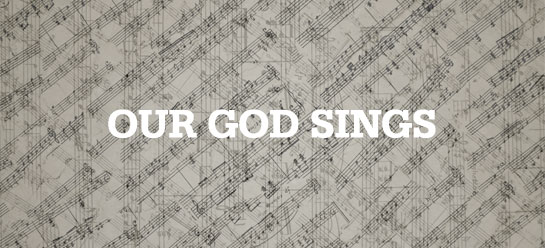Have you ever asked the question, ‘Why do we sing?’ Why has God made us in such a way that we are able to distinguish different musical notes? Does this reality have any significance for us as Christians – those who worship the Triune God?
It is, of course, no feat to persuade people of the existence of music. Whether it’s a bird singing sweetly in the middle of the countryside or the latest chart topper being pumped out through speakers in a shopping centre, music is very hard to escape. But to be told that every instance of music is an echo – however faint – of a divine composition, performed live by each member of the Trinity, and which has been growing since before the creation? Well, that might raise a few eyebrows! But that is essentially what we seek to show in this article. We will look at how the Bible shows God to be a ‘singing God’ and how music, therefore, is hugely significant for humans made in the image of God. We will also look at how all of this affects our understanding of what we are doing – and what God is doing – as we come together in corporate worship.
Making Music
So how can we describe what music is? Well, from the simplest composition to the grandest concerto, two elements are always present: melody and rhythm. Melody is probably the most natural and instinctive musical sense we are born with, but it is rhythm that turns notes of different pitches into melody. A mother’s natural instinct is to sing over her infant child to soothe and to help sleep. Children from a very early age, without being taught, will naturally use different pitches of sound to express themselves as their language skills grow and develop. This seems to be universal in all cultures and civilizations. But there is a third element that takes music to another level: harmony. Harmony is where notes of different pitches are sung or played together. The earliest awareness of this would have been the spacing of the fifth; an interval of two notes played or sung together which we would recognize today as the first note and fifth note of our conventional scale. Two notes together moving in parallel would have formed the first harmony. Music historians call this ‘organum’, and it has its roots in the music making of many ancient civilizations. Certainly the very earliest church music used this to set the words of the Psalms to music. It is, however, the introduction of a third note that produces a chord and gives the open fifth a distinctive quality. Different notes interact with each other in different ways, creating different moods depending on the intervals between each note. Even the musically uninitiated would quickly be able to distinguish between a minor and major chord, the first creating a darker, more poignant sound as opposed to the major chord which sounds brighter, even happier.
This organization of sound, which we call music, instinctively connects with the human psyche. At their most primitive and basic, melody and rhythm have an immediacy that connects even with the youngest infant. Harmony brings a sense of completion to these three elements.
The Bible teaches us that we are made in the image of God, and this intuitive connection we have with music is because God is a musical God. God who created the world and everything in it, and what he has made speaks of him.
‘For his invisible attributes, namely his, eternal power and divine nature, have been clearly perceived, ever since the creation of the world, in the things that have been made.’ Romans 1:20
God has not only created the physical universe, he has also created everything that makes his universe work for the benefit of the human race. In Job 38:4 we learn that music was right at the heart of creation in a sublime account of God’s creative activity in the universe. Here we read about the morning stars ‘singing together’: song was at the heart of God’s creativity in the universe. Composers have tried to recapture what that may have sounded like with their songs of the spheres. Scientists and astronomers today have suggested a song-like sound is coming from planets. Over the centuries there have been many fanciful theories regarding planets and music, but it is the Bible that shows the God of creation rejoicing in song over what he had made.
The Trinity in Creation
It is the creation story that gives us our first understanding of God as Trinity – one God in three Persons. There are many verses in the Bible that speak of God as the creator: he is the source of everything, creating the universe out of nothing. Isaiah 40;28 asks, ‘Have you not known? Have you not heard? The Lord is the everlasting God, the Creator of the ends of the earth’; Isaiah 45;12 says, ‘I made the earth and created man on it; it was my hands that stretched out the heavens, and I commanded all their host.’ God is the author and initiator of creation by his spoken word, and many religions and cults appear to have a similar concept as their starting point, but authentic Christian belief takes us further. The word of God reveals that the Father is the initiator, but that the Son and Holy Spirit are the agents and means by which creation actually happened.
‘In the beginning was the Word, and the Word was with God, and the Word was God. He was in the beginning with God. All things were made through Him, and without him was not anything made that was made.’ John 1:1–2
Thus begins John’s testimony about the coming of Jesus into the world. Jesus is God’s clearly articulated speech to the human race. The Father of creation reveals himself through his Word, Jesus. God spoke and creation happened, and that powerful creative divine fiat, the Word of God, is now appearing as flesh on planet earth.
The Apostle Paul in the book of Colossians explains this even further.
‘He is the image of the invisible God, the firstborn of all creation. For by him all things were created, in heaven and on earth, visible and invisible whether thrones or dominions or rulers or authorities – all things were created through him and for him.’ Colossians 1:15–17.
The Trinitarian aspect of creation is completed when we look at the activity of the Holy Spirit. It is as early as the first three verses in Genesis that we are introduced to the Holy Spirit.
‘In the beginning God created the heavens and the earth. The earth was without form and void, and darkness was over the face of the deep. And the Spirit of God was hovering over the face of the waters.’ Genesis 1:1–2
The Spirit of God is the active, creative presence of God. The Hebrew word translated as ‘Spirit’ is ruach. He is the powerful, dynamic, creative presence of Almighty God. Psalm 104:30 says ‘When you send forth your ruach (Spirit, or breath) they are created, and you renew the face of the ground.’
When we speak of God as creator we are elevated into a sublime concept of an almighty powerful God, who as Father initiates, who as the Son speaks and sustains, and who as the Spirit powerfully accomplishes and activates.
Our Musical God and His Singing People
This notion of the ‘three in one’ is not an easy concept for us to get our heads around. The Athanasian Creed, famous for its strong focus on Trinitarian doctrine exhorts us to, ‘Worship one God in Trinity, and Trinity in Unity; Neither confounding the Persons; nor dividing the Essence’. This is not easy. Many have tried to help using illustrations from a three leaf clover to the three states of water – or even and egg with its white, yolk, and shell. But all of these fall woefully short of what is actually going on in the Godhead. Interestingly though, music can really help us here – especially harmony. When you hear a chord of three notes played on a piano, these three tones are all audible as different tones. Yet they sound through each other, creating a sound that is distinctively three, yet together as one. Where visual illustrations fail, this simple audible exercise profoundly equips us to grasp something of how the Godhead interacts. It is a ‘three note resonance of life’ to quote Jeremy Begbie.
So God created music, and music in turn points us back to God. This truth of God as creator should be a key motivation for our worship. The book of Psalms particularly has numerous passages, extolling the greatness of God in creation. To realize the activity of a sovereign God in creating and sustaining the universe builds-up our faith. In Romans 4:17 Paul gives us an example from the life of Abraham. ‘… in the presence of God in whom he (Abraham) believed who gives life to the dead and calls into existence the things that do not exist.’
Our Triune God has made all things well. No wonder the morning stars sang together for joy at the work of His mighty hand.
The fact is that God has made song an integral part of his creation, and it should come as no surprise that song should figure in his dealings with the human race. Song played a significant part in the formation of His calling, redeeming and releasing to his people.
When God delivered his people from Egypt and brought them triumphantly through the Red Sea, the song of Moses not only expressed a great release of praise for the occasion, but also has served as an inspirational model for the content of our worship today. The holiness and majesty of God, his almighty power, his redemptive work, and his formation of a people are all characteristics of this great prophetic song. That musical instruments were used to accompany the song with Miriam and the women playing their tambourines shows not only Gods approval, but also his delight in expressing praise in this way. It delights his heart because it reflects who he is.
The songs of Deborah, Hannah, the Psalms, and the book of Habakkuk are all sung expressions of praise and prophecy. God even speaks through song because he is a singing God. To say this is not to compartmentalize an aspect of his character into a minor revelation, something he does but is unimportant. God is intrinsically a musical God who has given the human race the ability to make music and sing. He imparts it because it is what he loves to do. We are musical as human beings because we are made in his image. There are songs God the Father sings, songs Jesus sings and songs the Holy Spirit sings. It is one song unified by the unity of the Godhead, but with different expressions.
The Father’s Song
Zephaniah the prophet was a contemporary of Jeremiah, and it was during the reforms of the good king Josiah that his message brought hope to the people of God. Although his message addressed the issues of his day there is timelessness about his message for the people of God today. In chapter 3 the prophet addresses God’s people as ‘the daughter of Zion’ and there is an exhortation to sing and worship, rejoicing in the victory of God as a mighty warrior. ‘Sing aloud O daughter of Zion; shout O Israel Rejoice and exult with all your heart, O daughter of Jerusalem.’ Here, God is not only seen as a great kingly warrior, but the Father of his daughter. There is a warmth and intimacy as the reassuring love of the Father bursts into his own jubilant song over His child:
‘The Lord your God is in your midst, a mighty one who will save; he will rejoice over you with gladness; he will quiet you by his love; he will exult over you with loud singing.’
The Father delights in his children with song.
The Saviour’s Song
In Matthew’s and Mark’s accounts of the final Passover meal we are told that Jesus and the disciples sang a hymn. It was customary for Jewish families to sing the Hallel Psalms as part of the Passover celebrations. Psalms 114 to 118 are prophetically messianic, and Psalm 118 has some poignant prophetic content regarding the suffering of the Messiah. Imagine Jesus the night before he is to die, singing with his disciples: ‘I shall not die but live, and recount the deeds of the Lord. The Lord has disciplined me severely, but he has not given me over to death.’ Psalm118:17-18. This is a responsive antiphonal psalm with the repeated line ‘His steadfast love endures forever.’ It would be likely that as this Psalm was sung by Jesus and the disciples that they would have sung it antiphonally. We of course do not know for sure but perhaps Jesus took the role of the cantor, or worship leader, with the disciples singing their response.
There are at least two other places in the New Testament where Jesus sings. Not in his earthly ministry as we have shown in the Gospels but in his position as our risen ascended, exalted Saviour. Both of these passages focus on the redemptive ministry of Jesus and all that he has accomplished both personally and cosmically.
Psalm 22 is a prophetic Psalm about the suffering of Jesus for us on the cross. It begins with the words, ‘My God My God why have you forsaken me?’ These were the words uttered by Jesus in his dying moments as the weight of all our sin was laid upon him. The horrors of death by crucifixion and the pain of Jesus suffering are vividly described in this psalm, but more particularly the accomplishments of his death are trumpeted for the world to see and know. ‘All the ends of the earth shall remember and turn to the Lord, and all the families of the nations shall worship before you.’ Psalm 22:27. Then in verse 22 he says, ‘I will tell of your name to my brothers; in the midst of the congregation I will praise you.’ That this praise was rendered in song is shown by the quotation of this verse in Hebrews 2:12. The writer to the Hebrews is explaining the greatness of our salvation in Christ and what it has achieved for us personally. He alludes to the suffering of Christ from Psalm 22, showing how, through it, many sons may be brought to glory. In verse 12 he quotes Psalm 22, but expands it to show that Jesus is singing praise. ‘I will tell of your name to my brothers, in the midst of the congregation I will sing your praise.’ It would seem that Jesus is rejoicing in our salvation by singing. The congregation in which he sings is not just with the disciples on earth as we saw in the Gospels, but now in his exalted state he sings the song in the company of his Father, the angels, and the redeemed saints in heaven, spilling over into the gathered church. When we sing our songs of salvation we are joining in the song that Jesus is singing over us. The impact of Psalm 22 and its fulfillment in Hebrews 2 is brilliantly encapsulated in Stuart Townend’s great hymn, ‘How deep the Fathers Love’:
‘How great the pain of searing loss!
The Father turns his face away,
As wounds which mar the chosen One
Bring many sons to glory.’
Another reference to Jesus singing can be found in Romans 15. Paul is talking about how Christ is now the hope of the Gentiles, and the impact the gospel of salvation has on the whole world. He quotes Psalm 18: ‘Therefore I will praise you among the Gentiles and sing to your name.’ Romans 15:9, quoting Psalm 18:49.
The Song of the Spirit
The Father sings, rejoicing in his sons and daughters; Jesus the Son sings, rejoicing in the accomplishments of salvation in both personal and cosmic redemption. The Holy Spirit is also very active in singing. It is the Holy Spirit who brings the reality, power, and passion of the Father’s song and the redemptive song of Jesus alive in us.
In Ephesians 5:18 we are told to be ‘filled with the Spirit’, and the result of this filling is that we will sing and make melody in our hearts with psalms, hymns, and spiritual songs. In 1 Corinthians 14:15 Paul says, ‘I will sing praise with my spirit but I will sing with my mind also.’ The sentence could be translated literally as, ‘I will sing in the manner the Spirit gives me.’ This suggests there is an activity of the Spirit in singing that goes beyond the mind. Human creativity and reason can express praise to God and produce great music and works of art. As we saw earlier, music is a gift of God to the human race out of his grace and love for mankind. If that human creativity and reason is unregenerate, it still gives glory to God even if man does not recognize it. The stage play Amadeus, which was turned into a film explores this theme through the music of Mozart. Yet there is a music and creativity that goes beyond our human skill or taste, where the Holy Spirit sings his song in us, causing us to burst into spontaneous worship. Singing in the Spirit is a way that God the Holy Spirit himself sings through us. This can be both personal and corporate. Jesus said the true worshippers are those who worship in Spirit and truth. Allowing the Spirit to sing through us is one way we can do that.
In Revelation chapter 1 the voice of Jesus is described as ‘like the sound of many waters.’ In chapter 14, John recounts his vision of the Lamb of God standing on Mount Zion with the whole company of the redeemed. He describes an incredible aural phenomenon: ‘And I heard a voice from heaven, like the sound of many waters and like the sound of loud thunder, and the voice which I heard was like throne and before the four living creatures and the elders; and no one could learn the song except the one hundred and forty four thousand who had been purchased from earth.’ When a whole congregation lifts up its voice as one in a harmonic blend of sound, singing a new song that nobody else can learn or understand, the resonance and tenor are evocative of a cascading waterfall. Could this be the sound of many waters that John heard? It is possible that the voice of Jesus, rejoicing in song in the midst of his children he has been given by his Father, has an aural realization when the body of Jesus joins in that song, as it is inspired by the Spirit.
True Worship
Understanding God as Trinity is essential if we are to be true worshippers. Our worship, which is essentially a matter of the heart, and our love for God, is to be expressed as we participate in what God himself is actually doing. The Father loves the Son who loves the Spirit, who glorifies the Son. God loves within himself. He is a God who sings over his creation and his redemptive work. He invites us to participate in his worship and gives us his Holy Spirit to make it possible. We become participants in the worshipping Godhead. James Torrance in his book Worship, Community, and the Triune God of Grace says,
‘Christian worship is therefore our participation through the Spirit, in the Son’s communion with the Father, in his vicarious life of worship and intercession. It is our response to our Father for all that He has done for us in Christ, our response of gratitude to God’s grace. Our self offering in body, mind, and Spirit in response to the one true offering made for us in Christ.’
The implications for us as personal worshippers, and in our corporate worship as congregations in church, is that we worship the Father through the Son by the Spirit. Our gatherings for corporate worship, and our expectation of engaging with him as we participate in what he is doing, should reflect this. It should affect the content of the songs we sing, the way worship leaders lead, and the way congregations enter in. This should lift our expectations that as we worship in Spirit and truth we are engaging in the most sublime experience in the universe.
Tags: Christian FellowshipReaction:











